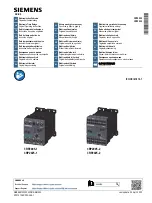
Date Code 20010521
Event Reports and Sequential Events Reporting
9-5
SEL-387E Instruction Manual
Winding Currents
The “Winding n Currents (A Sec), ABC:” (n = 1, 2, or 3) field shows each winding input current
present in the event report row containing the maximum secondary phase current. The standard
15-, 29-, or 60-cycle event report will mark the reference row used in the summary report with
an asterisk. The listed currents for each of the three (3) winding inputs are:
Phase (A = channel IA, B = channel IB, C = channel IC)
Voltages
The “Winding n Voltages (V Sec), ABC:” (n = 1, 2, or 3) field shows each winding input voltage
present in the event report row containing the maximum secondary phase current. The standard
15-, 29-, or 60-cycle event report will mark the reference row used in the summary report with
an asterisk. The listed voltages for each of the three (3) winding inputs are:
Phase (A = channel VA, B = channel VB, C = channel VC)
Percent Volts/Hertz
Retrieving Full-Length Standard Event Reports
Any given event report has four different ways it can be displayed, depending on the particular
serial port command issued to the relay. The command choices are shown below.
Serial Port
Command Format
EVENT
Winding event report
EVENT C
Compressed ASCII event report
EVENT D
Digital event report
EVENT DIF
Differential event report
EVENT R
Raw (unfiltered) winding event report
Event (Winding Event Report)
The winding event report contains secondary phase currents for each of the three current winding
inputs and secondary phase voltages for the voltage winding inputs, as well as the status of the
eight digital outputs and six optoisolated inputs.
Use the
EVE
command to retrieve winding event reports. There are several options for
customizing the report format. The general command format is:
EVE [n, Sx, Ly[-[w]]]
(parameters in [ ] are optional)
where:
n
Event number; defaults to 1 if not listed, where 1 is the most recent event.
Sx
Display x samples per cycle (4 or 8); defaults to 4 if not listed.
Ly
Display y cycles of data (1 to LER); defaults to LER if not listed.













































